通过ELK快速搭建一个你可能需要的集中化日志平台
Posted
tags:
篇首语:本文由小常识网(cha138.com)小编为大家整理,主要介绍了通过ELK快速搭建一个你可能需要的集中化日志平台相关的知识,希望对你有一定的参考价值。
在项目初期的时候,大家都是赶着上线,一般来说对日志没有过多的考虑,当然日志量也不大,所以用log4net就够了,随着应用的越来越多,日志散
落在各个服务器的logs文件夹下,确实有点不大方便,这个时候就想到了,在log4net中配置 mysql的数据源,不过这里面有一个坑,熟悉log4net的同学知
道写入mysql有一个batch的阈值,比如说batchcache中有100条,才写入mysql,这样的话,就有一个延迟的效果,而且如果batchcache中不满100条的话,
你在mysql中是看不到最新的100条日志。。。而且采用中心化的mysql,涉及到tcp传输,其中的性能大家也应该明白,而且mysql没有一个好的日志界面,
只能自己去写UI,所以还还得继续寻找其他的解决方案,也就是本篇的ELK。
一:ELK名字解释
ELK就是ElasticSearch + LogStash + Kibana,这三样搭配起来确实非常不错,先画张图给大家看一下。
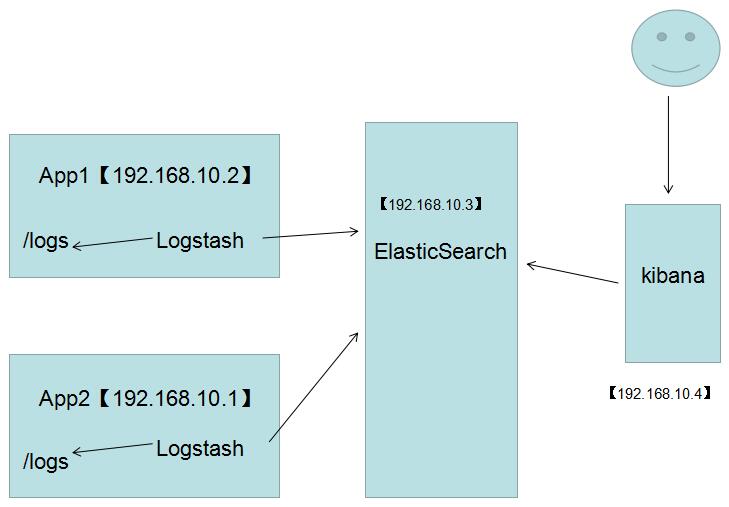
1. LogStash
它可以流放到各自的服务器上收集Log日志,通过内置的ElasticSearch插件解析后输出到ES中。
2.ElasticSearch
这是一个基于Lucene的分布式全文搜索框架,可以对logs进行分布式存储,有点像hdfs哈。。。
3. Kibana
所有的log日志都到ElasticSearch之后,我们需要给他展示出来,对吧? 这个时候Kibana就出手了,它可以多维度的展示es中的数据。这也解决了
用mysql存储带来了难以可视化的问题。
二:快速搭建
上面只是名词解释,为了演示,我只在一台centos上面搭建了。
1. 官方下载 :https://www.elastic.co/cn/products,在下面这张图上,我们找到对应的三个产品,进行下载就好了。
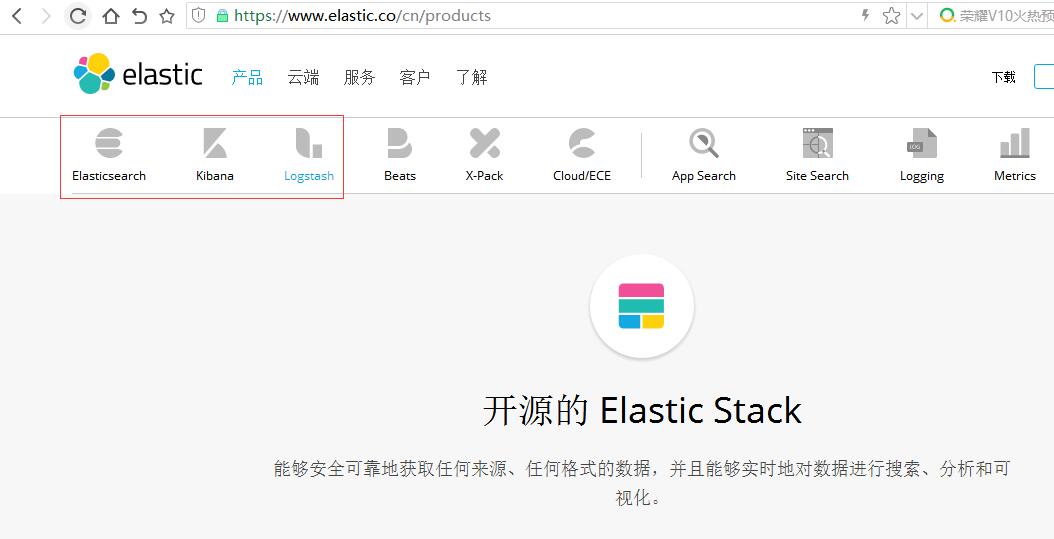
[root@slave1 myapp]# ls elasticsearch kafka_2.11-1.0.0.tgz nginx-1.13.6.tar.gz elasticsearch-5.6.4.tar.gz kibana node elasticsearch-head kibana-5.2.0-linux-x86_64.tar.gz node-v8.9.1-linux-x64.tar.xz images logstash portal java logstash-5.6.3.tar.gz service jdk1.8 logstash-tutorial-dataset sql jdk-8u144-linux-x64.tar.gz nginx kafka nginx-1.13.6 [root@slave1 myapp]#
我这里下载的是elasticsearch 5.6.4,kibana5.2.0 ,logstash5.6.3三个版本。。。然后用 tar -xzvf解压一下。
2. logstash配置
解压完之后,我们到config目录中新建一个logstash.conf配置。
[root@slave1 config]# ls jvm.options log4j2.properties logstash.conf logstash.yml startup.options [root@slave1 config]# pwd /usr/myapp/logstash/config [root@slave1 config]# vim logstash.conf
然后做好input ,filter,output三大块, 其中input是吸取logs文件下的所有log后缀的日志文件,filter是一个过滤函数,这里不用配置,output配置了导入到
hosts为127.0.0.1:9200的elasticsearch中,每天一个索引。
input { file { type => "log" path => "/logs/*.log" start_position => "beginning" } } output { stdout { codec => rubydebug { } } elasticsearch { hosts => "127.0.0.1" index => "log-%{+YYYY.MM.dd}" } }
配置完了之后,我们就可以到bin目录下启动logstash了,配置文件设置为conf/logstash.conf,从下图中可以看到,当前开启的是9600端口。
[root@slave1 bin]# ls cpdump logstash logstash.lib.sh logstash-plugin.bat setup.bat ingest-convert.sh logstash.bat logstash-plugin ruby system-install [root@slave1 bin]# ./logstash -f ../config/logstash.conf Sending Logstash\'s logs to /usr/myapp/logstash/logs which is now configured via log4j2.properties [2017-11-28T17:11:53,411][INFO ][logstash.modules.scaffold] Initializing module {:module_name=>"fb_apache", :directory=>"/usr/myapp/logstash/modules/fb_apache/configuration"} [2017-11-28T17:11:53,414][INFO ][logstash.modules.scaffold] Initializing module {:module_name=>"netflow", :directory=>"/usr/myapp/logstash/modules/netflow/configuration"} [2017-11-28T17:11:54,063][INFO ][logstash.outputs.elasticsearch] Elasticsearch pool URLs updated {:changes=>{:removed=>[], :added=>[http://127.0.0.1:9200/]}} [2017-11-28T17:11:54,066][INFO ][logstash.outputs.elasticsearch] Running health check to see if an Elasticsearch connection is working {:healthcheck_url=>http://127.0.0.1:9200/, :path=>"/"} [2017-11-28T17:11:54,199][WARN ][logstash.outputs.elasticsearch] Restored connection to ES instance {:url=>"http://127.0.0.1:9200/"} [2017-11-28T17:11:54,244][INFO ][logstash.outputs.elasticsearch] Using mapping template from {:path=>nil} [2017-11-28T17:11:54,247][INFO ][logstash.outputs.elasticsearch] Attempting to install template {:manage_template=>{"template"=>"logstash-*", "version"=>50001, "settings"=>{"index.refresh_interval"=>"5s"}, "mappings"=>{"_default_"=>{"_all"=>{"enabled"=>true, "norms"=>false}, "dynamic_templates"=>[{"message_field"=>{"path_match"=>"message", "match_mapping_type"=>"string", "mapping"=>{"type"=>"text", "norms"=>false}}}, {"string_fields"=>{"match"=>"*", "match_mapping_type"=>"string", "mapping"=>{"type"=>"text", "norms"=>false, "fields"=>{"keyword"=>{"type"=>"keyword", "ignore_above"=>256}}}}}], "properties"=>{"@timestamp"=>{"type"=>"date", "include_in_all"=>false}, "@version"=>{"type"=>"keyword", "include_in_all"=>false}, "geoip"=>{"dynamic"=>true, "properties"=>{"ip"=>{"type"=>"ip"}, "location"=>{"type"=>"geo_point"}, "latitude"=>{"type"=>"half_float"}, "longitude"=>{"type"=>"half_float"}}}}}}}} [2017-11-28T17:11:54,265][INFO ][logstash.outputs.elasticsearch] New Elasticsearch output {:class=>"LogStash::Outputs::ElasticSearch", :hosts=>["//127.0.0.1"]} [2017-11-28T17:11:54,266][INFO ][logstash.pipeline ] Starting pipeline {"id"=>"main", "pipeline.workers"=>2, "pipeline.batch.size"=>125, "pipeline.batch.delay"=>5, "pipeline.max_inflight"=>250} [2017-11-28T17:11:54,427][INFO ][logstash.pipeline ] Pipeline main started [2017-11-28T17:11:54,493][INFO ][logstash.agent ] Successfully started Logstash API endpoint {:port=>9600}
3. elasticSearch
这个其实也是ELK中的核心,启动的时候一定要注意,因为es不可以进行root账户启动,所以你还需要开启一个elsearch账户。
groupadd elsearch #新建elsearch组 useradd elsearch -g elsearch -p elasticsearch #新建一个elsearch用户 chown -R elsearch:elsearch ./elasticsearch #指定elasticsearch所属elsearch组
接下来我们默认启动就好了,什么也不用配置,然后在日志中大概可以看到开启了9200,9300端口。
[elsearch@slave1 bin]$ ./elasticsearch [2017-11-28T17:19:36,893][INFO ][o.e.n.Node ] [] initializing ... [2017-11-28T17:19:36,973][INFO ][o.e.e.NodeEnvironment ] [0bC8MSi] using [1] data paths, mounts [[/ (rootfs)]], net usable_space [17.9gb], net total_space [27.6gb], spins? [unknown], types [rootfs] [2017-11-28T17:19:36,974][INFO ][o.e.e.NodeEnvironment ] [0bC8MSi] heap size [1.9gb], compressed ordinary object pointers [true] [2017-11-28T17:19:36,982][INFO ][o.e.n.Node ] node name [0bC8MSi] derived from node ID [0bC8MSi_SUywaqz_Zl-MFA]; set [node.name] to override [2017-11-28T17:19:36,982][INFO ][o.e.n.Node ] version[5.6.4], pid[12592], build[8bbedf5/2017-10-31T18:55:38.105Z], OS[Linux/3.10.0-327.el7.x86_64/amd64], JVM[Oracle Corporation/Java HotSpot(TM) 64-Bit Server VM/1.8.0_144/25.144-b01] [2017-11-28T17:19:36,982][INFO ][o.e.n.Node ] JVM arguments [-Xms2g, -Xmx2g, -XX:+UseConcMarkSweepGC, -XX:CMSInitiatingOccupancyFraction=75, -XX:+UseCMSInitiatingOccupancyOnly, -XX:+AlwaysPreTouch, -Xss1m, -Djava.awt.headless=true, -Dfile.encoding=UTF-8, -Djna.nosys=true, -Djdk.io.permissionsUseCanonicalPath=true, -Dio.netty.noUnsafe=true, -Dio.netty.noKeySetOptimization=true, -Dio.netty.recycler.maxCapacityPerThread=0, -Dlog4j.shutdownHookEnabled=false, -Dlog4j2.disable.jmx=true, -Dlog4j.skipJansi=true, -XX:+HeapDumpOnOutOfMemoryError, -Des.path.home=/usr/myapp/elasticsearch] [2017-11-28T17:19:37,780][INFO ][o.e.p.PluginsService ] [0bC8MSi] loaded module [aggs-matrix-stats] [2017-11-28T17:19:37,780][INFO ][o.e.p.PluginsService ] [0bC8MSi] loaded module [ingest-common] [2017-11-28T17:19:37,780][INFO ][o.e.p.PluginsService ] [0bC8MSi] loaded module [lang-expression] [2017-11-28T17:19:37,780][INFO ][o.e.p.PluginsService ] [0bC8MSi] loaded module [lang-groovy] [2017-11-28T17:19:37,780][INFO ][o.e.p.PluginsService ] [0bC8MSi] loaded module [lang-mustache] [2017-11-28T17:19:37,780][INFO ][o.e.p.PluginsService ] [0bC8MSi] loaded module [lang-painless] [2017-11-28T17:19:37,780][INFO ][o.e.p.PluginsService ] [0bC8MSi] loaded module [parent-join] [2017-11-28T17:19:37,780][INFO ][o.e.p.PluginsService ] [0bC8MSi] loaded module [percolator] [2017-11-28T17:19:37,781][INFO ][o.e.p.PluginsService ] [0bC8MSi] loaded module [reindex] [2017-11-28T17:19:37,781][INFO ][o.e.p.PluginsService ] [0bC8MSi] loaded module [transport-netty3] [2017-11-28T17:19:37,781][INFO ][o.e.p.PluginsService ] [0bC8MSi] loaded module [transport-netty4] [2017-11-28T17:19:37,781][INFO ][o.e.p.PluginsService ] [0bC8MSi] no plugins loaded [2017-11-28T17:19:39,782][INFO ][o.e.d.DiscoveryModule ] [0bC8MSi] using discovery type [zen] [2017-11-28T17:19:40,409][INFO ][o.e.n.Node ] initialized [2017-11-28T17:19:40,409][INFO ][o.e.n.Node ] [0bC8MSi] starting ... [2017-11-28T17:19:40,539][INFO ][o.e.t.TransportService ] [0bC8MSi] publish_address {192.168.23.151:9300}, bound_addresses {[::]:9300} [2017-11-28T17:19:40,549][INFO ][o.e.b.BootstrapChecks ] [0bC8MSi] bound or publishing to a non-loopback or non-link-local address, enforcing bootstrap checks [2017-11-28T17:19:43,638][INFO ][o.e.c.s.ClusterService ] [0bC8MSi] new_master {0bC8MSi}{0bC8MSi_SUywaqz_Zl-MFA}{xcbC53RVSHajdLop7sdhpA}{192.168.23.151}{192.168.23.151:9300}, reason: zen-disco-elected-as-master ([0] nodes joined) [2017-11-28T17:19:43,732][INFO ][o.e.h.n.Netty4HttpServerTransport] [0bC8MSi] publish_address {192.168.23.151:9200}, bound_addresses {[::]:9200} [2017-11-28T17:19:43,733][INFO ][o.e.n.Node ] [0bC8MSi] started [2017-11-28T17:19:43,860][INFO ][o.e.g.GatewayService ] [0bC8MSi] recovered [1] indices into cluster_state [2017-11-28T17:19:44,035][INFO ][o.e.c.r.a.AllocationService] [0bC8MSi] Cluster health status changed from [RED] to [YELLOW] (reason: [shards started [[.kibana][0]] ...]).
4. kibana
它的配置也非常简单,你需要在kibana.yml文件中指定一下你需要读取的elasticSearch地址和可供外网访问的bind地址就可以了。
[root@slave1 config]# pwd /usr/myapp/kibana/config [root@slave1 config]# vim kibana.yml elasticsearch.url: "http://localhost:9200"
server.host: 0.0.0.0
然后就是启动,从日志中可以看出,当前开了5601端口。
[root@slave1 kibana]# cd bin [root@slave1 bin]# ls kibana kibana-plugin nohup.out [root@slave1 bin]# ./kibana log [01:23:27.650] [info][status][plugin:kibana@5.2.0] Status changed from uninitialized to green - Ready log [01:23:27.748] [info][status][plugin:elasticsearch@5.2.0] Status changed from uninitialized to yellow - Waiting for Elasticsearch log [01:23:27.786] [info][status][plugin:console@5.2.0] Status changed from uninitialized to green - Ready log [01:23:27.794] [warning] You\'re running Kibana 5.2.0 with some different versions of Elasticsearch. Update Kibana or Elasticsearch to the same version to prevent compatibility issues: v5.6.4 @ 192.168.23.151:9200 (192.168.23.151) log [01:23:27.811] [info][status][plugin:elasticsearch@5.2.0] Status changed from yellow to green - Kibana index ready log [01:23:28.250] [info][status][plugin:timelion@5.2.0] Status changed from uninitialized to green - Ready log [01:23:28.255] [info][listening] Server running at http://0.0.0.0:5601 log [01:23:28.259] [info][status][ui settings] Status changed from uninitialized to green - Ready
5. 浏览器中输入:http://192.168.23.151:5601/ 你就可以打开kibana页面了,,默认让我指定一个查看的Index。
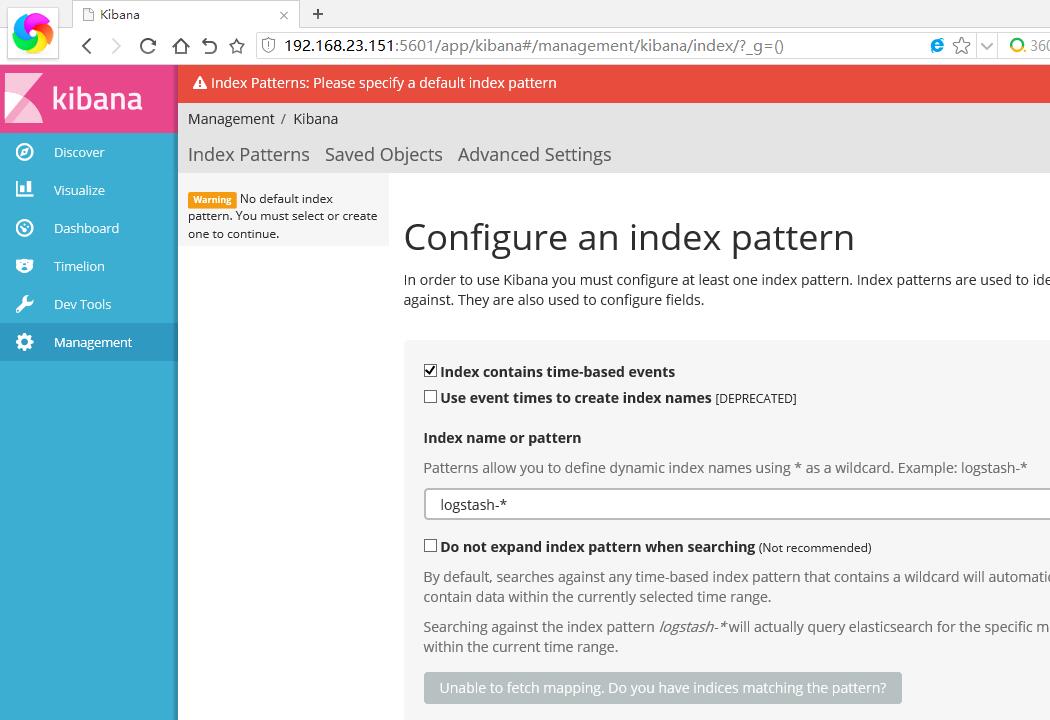
接下来我们在本机的/logs文件夹下创建一个简单的1.log文件,内容为“hello world”,然后在kibana上将logstash-* 改成 log* ,Create按钮就会自动出来。
[root@slave1 logs]# echo \'hello world\' > 1.log
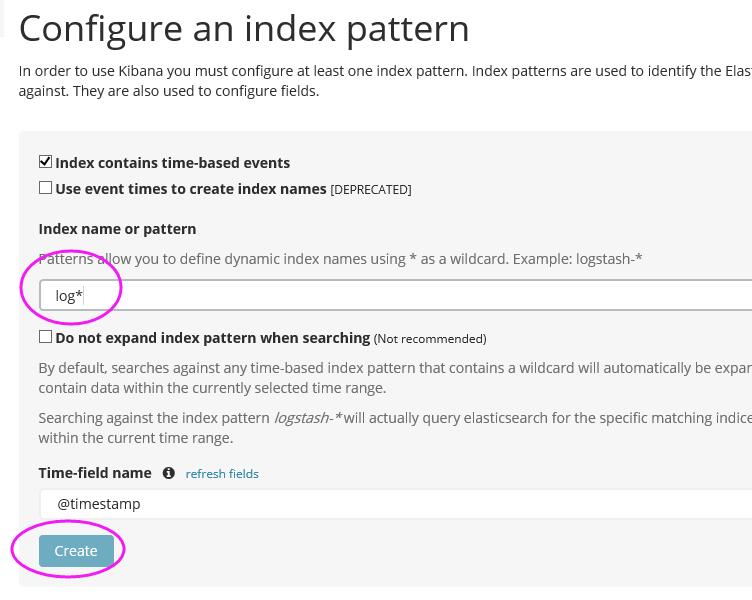
进入之后,点击Discover,你就可以找到你输入的内容啦~~~~ 是不是很帅气。。。
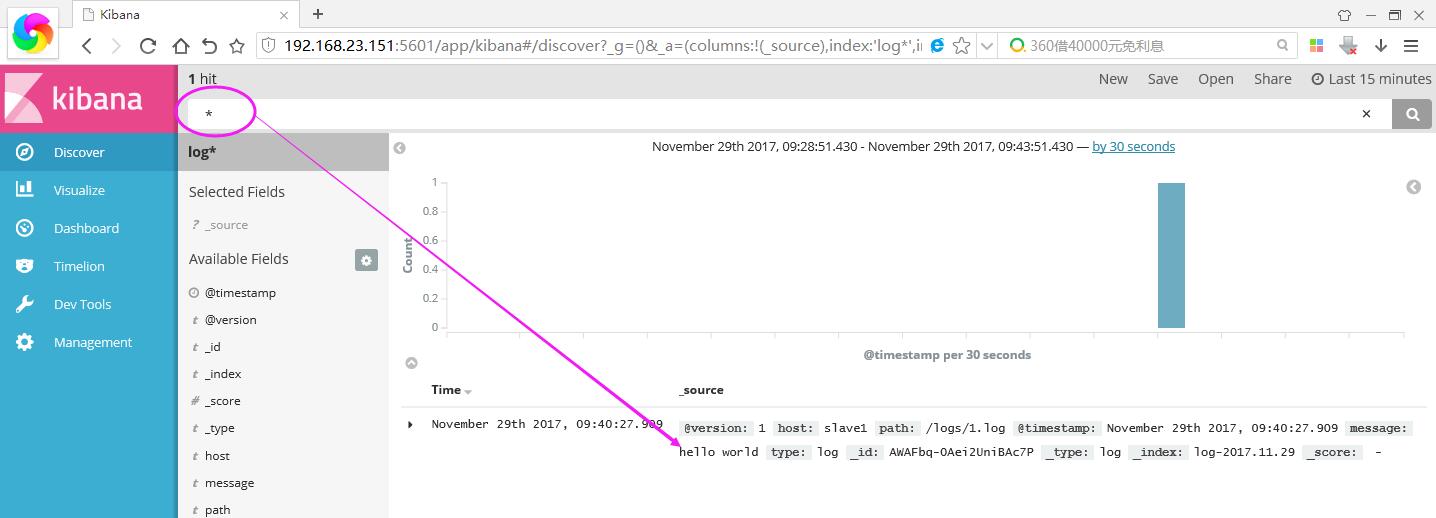
如果你装了head安装包,你还可以看到它确实带了日期模式的Index索引,还自带5个默认分片数。
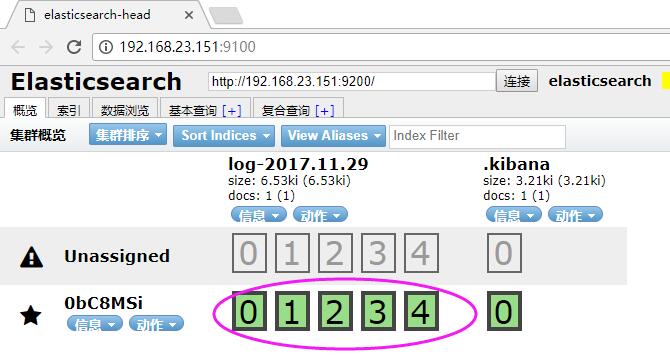
好了,本篇就说这么多吧,希望对你有帮助。
以上是关于通过ELK快速搭建一个你可能需要的集中化日志平台的主要内容,如果未能解决你的问题,请参考以下文章